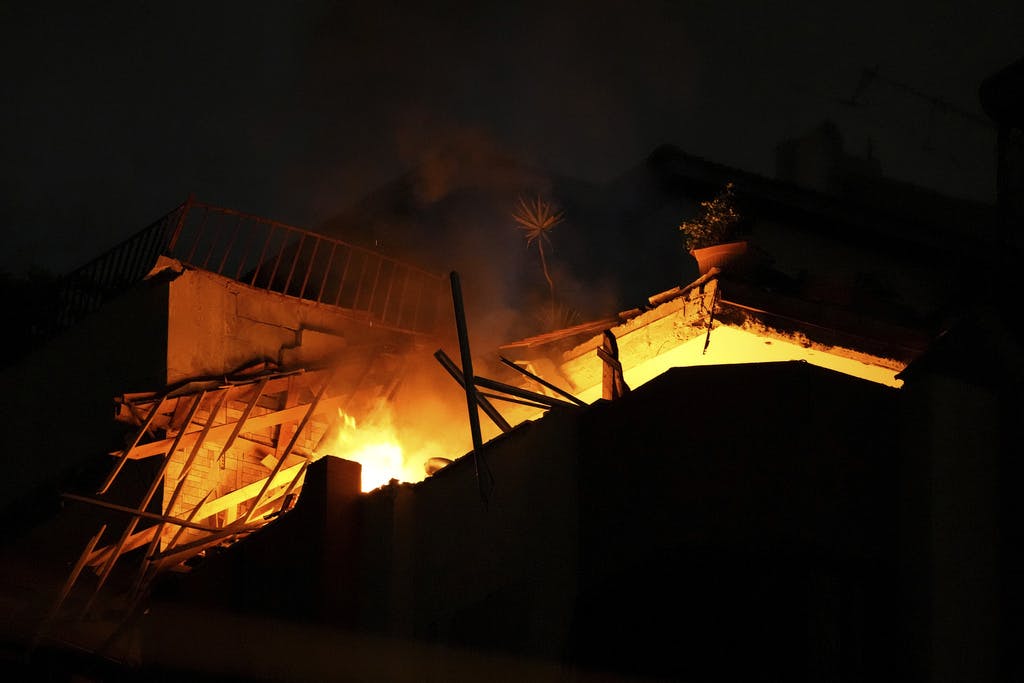After Successful Anti-Terrorism Operation, Israel Awaits Iran-Backed Retaliation
The country is well aware that a round of hostilities has the potential to quickly escalate into a major, painful war. Prime Minister Netanyahu says Israel is ‘preparing for Iran’s attempt to start a multi-front campaign against us.’

Israel is bracing for a possible multi-front, Tehran-backed attack in retaliation for Tuesday morning’s killing at Gaza of three top commanders of the Palestinian Islamic Jihad, Iran’s main proxy terrorist group in the Palestinian territories.
The early morning Israeli Defense Forces air strikes, dubbed Operation Shield and Arrow, targeted the apartments where the arch-terrorists lived. Killed in the operation were the PIJ commander in northern Gaza, Khalil Bahtini; its West Bank coordinator, Tareq Izzeldeen; and the secretary of the group’s military council, Jehad Ghanam.
In addition, 10 civilians, including women and children, were killed. As Israel awaits retaliation, officials are also concerned about likely foreign condemnation. Because one of the casualties, a medical doctor named Dzhamal Khasvan, held Russian citizenship, Moscow’s ambassador to Israel, Anatoly Viktorov, unironically condemned Israel’s “unilateral violent action.”
The Israeli strike followed last week’s barrage of 110 rockets shot from Gaza by the Islamic Jihad. Prime Minister Netanyahu and his defense minister, Yoav Galant, reportedly conducted their planning for the strike in complete secrecy for fear that cabinet members, including the far-right police minister, Itamar Ben Gvir, would brag about the plan to the press.
Israel has long considered strikes against military leaders a legitimate tool in its anti-terrorism arsenal. PIJ commanders in Gaza were hit by the IDF last year, under a government headed by Naftali Bennett and the center-left opposition leader, Yair Lapid. While enemies eye Israel’s deep political fissures as an opportunity to attack a divided country, Mr. Netantahu’s opponents expressed support for the Tuesday operation.
“Our enemies were mistaken in their assessment of Israel,” a frequent critic of the premier who currently leads the polls among Israeli politicians, Benny Gantz, tweeted. “Israel’s security forces and the government all have my full support in any determined actions taken with the purpose of defending the citizens of Israel.”
Despite the near wall-to-wall internal support for the operation, the country is well aware that a round of hostilities has the potential to quickly escalate into a major, painful war. The immediate question is whether the main power in Gaza, Hamas, would join its junior partner, or prefer to sit out this round. Iran, meanwhile, is urging proxies to launch simultaneous attacks from all directions.
“Ninety-five percent of our security problems come from Iran,” Mr. Netanyahu told a conference on Tuesday. “We are preparing for Iran’s attempt to start a multi-front campaign against us. If we need to, we can face it.”
The Islamic Republic has developed a strategy of “uniting the fronts” against Israel, and it is likely to follow through this time, an Arab world watcher at the Jerusalem Center for Public Affairs, Yoni Ben Menachem, tells the Sun. The strategy was discussed when the secretary general of the Gaza-based PIJ, Ziad Nakhaleh, met at Tehran in August with the head of the Islamic Revolutionary Guards Corps, Hossein Salami.
Following that meeting, Mr. Ben Menachem says, the PIJ branched out from Gaza into the northern West Bank, where it recruited more than a 1,000 men to join 10 terrorist cells. The PIJ is overseeing a major gun-smuggling route to the West Bank from Iran through Jordan. “It is a wholly owned Iranian subsidiary, while Hamas, which is also backed by Iran, at least maintains a measure of independence,” he says.
“Hamas has previously sat out or offered only tacit support for Islamic Jihad provocations,” a researcher at the Foundation for Defense of Democracies, Joe Truzman, says. Yet, he says, “Iran will be exerting pressure on it to get off the fence.”
If Hamas joins the fight this time, “we may face a long and painful war,” Mr. Ben Menachem says. Israel is reportedly signaling to Hamas that it is not interested in a major confrontation.
Jerusalem realizes that such a confrontation could quickly spread beyond Gaza. Tehran “is extending its patronage to Palestinian organizations not only in the Gaza Strip, but also in the West Bank and Southern Lebanon,” the founder of a northern Israel-based think tank, Alma center, Sarit Zehavi, says.
Last month, a Hamas unit operating from an area controlled by Hezbollah in southern Lebanon shot a salvo at northern Israel in what seemed like a dress rehearsal for a major attack. Beyond Gaza in the south, the West Bank in the east, and Lebanon in the north, Israel could also be hit from the Syrian side of the Golan Heights, where the IRGC has long established a beachhead for potential attacks.
Iran has furnished its proxies with longer-range and ever more accurate missiles. In case of a major conflict, these groups will aim at the heart of the country, including high-value targets like the Tel Aviv-based defense ministry or the Dimona nuclear center.
The IDF has long prepared for such a multi-pronged attack. Israel is hoping it would be spared a major conflict this time around, but it also knows that after its successful hit on Iran’s top Palestinian proxy, a region-wide war is a possibility.

